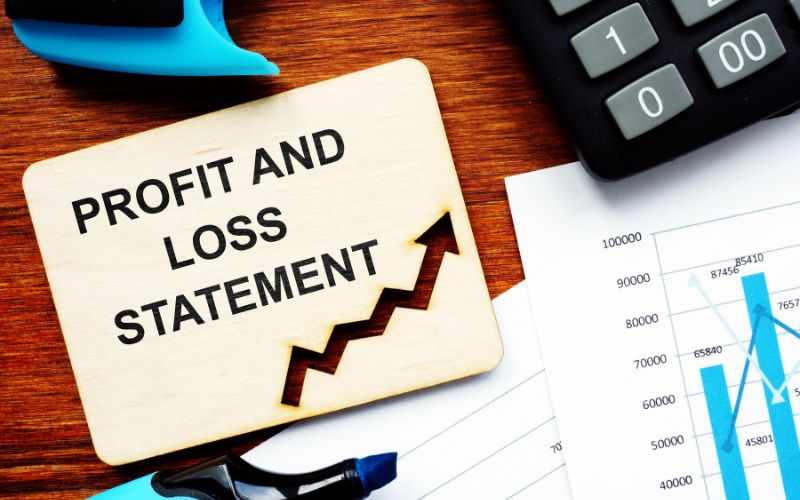Small Business Resources
Explore Vyde’s free business resources to discover financial insights and tips that will benefit your business.

Featured



Explore

In today’s fast-paced financial landscape, staying funding-ready is more crucial than ever—especially for entrepreneurs and small business owners. Whether you’re applying for a loan, seeking investment, or just trying to maintain a healthy financial profile, your credit score plays a pivotal role. One of the most effective ways to ensure you’re always in a strong position is by using credit monitoring tools.
These tools offer more than just a view of your credit report—they provide insights, alerts, and protection to help you maintain your credit health. In this article, we’ll explore how credit monitoring tools help you stay funding-ready, break down their types, key features, and benefits, and explain why partnering with Vyde for your accounting and tax needs can further enhance your financial success.
Importance of Credit Monitoring
Before diving into the tools themselves, it’s important to understand the importance of credit monitoring. Your credit score is one of the key metrics lenders, investors, and financial institutions use to assess your financial reliability. Any unexpected changes, such as unauthorized activity or identity theft, can seriously impact your ability to secure funding.
Credit monitoring provides real-time or near-real-time updates on changes to your credit file, helping you catch issues early and respond appropriately. It allows you to take proactive steps to protect your financial health, fix inaccuracies, and improve your overall creditworthiness.
Types of Credit Monitoring Tools
There are various types of credit monitoring tools available today, each with different levels of service, accessibility, and features. Understanding the types can help you choose the right one based on your needs and budget.
Free Credit Monitoring
Free credit monitoring services typically provide basic credit score tracking and occasional alerts for changes to your credit report. They’re a good starting point for individuals who want to monitor their credit without any financial commitment.
Paid Credit Monitoring
Paid credit monitoring services go beyond the basics, offering in-depth reports, frequent updates, fraud alerts, and identity theft protection. These services often include credit lock/freezes, credit score simulators, and access to multiple credit bureaus.
Credit Monitoring Apps and Services
Many credit monitoring apps and services are available on mobile platforms, making it convenient to track your credit on the go. These apps offer instant alerts, personalized insights, and easy access to your credit scores and reports.
Credit Card and Financial Institution Alerts
Several credit card companies and financial institutions offer credit monitoring as part of their customer service. These tools send alerts for unusual activity, new credit inquiries, or significant changes in your credit score.
Though not as feature-rich as dedicated services, these alerts can be a helpful first line of defense and work well when combined with other monitoring tools.

Key Features of Credit Monitoring Tools
To fully grasp how credit monitoring tools help you stay funding-ready, it’s essential to understand their core features and how they contribute to maintaining your financial health.
Credit Report and Score Monitoring
One of the primary features is credit report and score monitoring. These tools track your credit score from one or more of the major bureaus and alert you to changes such as new accounts, payment delinquencies, or updated personal information.
Monitoring helps you spot mistakes and take corrective action early, keeping your credit profile clean and appealing to lenders.
Fraud Alerts
Fraud alerts notify you when suspicious activity appears on your credit report, such as a new loan application or account opening that you didn’t initiate. Early alerts enable quick responses, potentially stopping fraud before it causes serious damage.
Identity Theft Protection
Advanced monitoring tools offer identity theft protection, scanning public records, dark web activity, and online databases for signs that your personal information has been compromised. These services often include identity restoration assistance and insurance for added security.
Credit Lock/Freeze
With credit lock or freeze features, you can restrict access to your credit report, preventing unauthorized inquiries and reducing the risk of identity theft. This is particularly useful if you suspect a security breach or have lost personal information.
Credit Score Education
Many platforms provide credit score education, offering personalized tips and resources on how to improve your credit health. These educational features empower users to make better financial decisions and stay prepared for funding opportunities.
Benefits of Using Credit Monitoring Tools
Now that we’ve discussed the types and features, let’s look at the real-world advantages and benefits of using credit monitoring tools.
Early Fraud Detection
One of the biggest benefits is early fraud detection. Credit monitoring tools help you identify unauthorized activities almost immediately, allowing you to act quickly to prevent further damage. This is especially crucial for business owners who depend on a strong credit profile for funding.
Improved Credit Health
Regular tracking helps improve your overall credit health by showing you how your actions—like paying down debt or opening new lines of credit—impact your score. Some tools even offer score simulators to help you predict the effects of different financial decisions.
Peace of Mind
Knowing that your credit is being monitored 24/7 provides invaluable peace of mind. You can focus on running your business or managing your finances without constantly worrying about your credit status.
Early Warning of Potential Problems
These tools offer early warning of potential problems, such as missed payments or rising debt levels. You’ll have the information you need to address issues before they spiral into larger financial troubles.

Why Vyde is the Best Accounting Partner for Your Business
While credit monitoring tools are essential for maintaining your credit health, partnering with a trusted accounting firm like Vyde elevates your overall financial strategy.
Vyde specializes in small business accounting, tax planning, and financial management. Their expert team ensures your financial records are accurate and up to date, which in turn supports a stronger credit profile. By helping you manage your books, reduce debt, and plan for tax season, Vyde complements your credit monitoring efforts and keeps you truly funding-ready.
Here’s why Vyde stands out:
- Tailored financial advice that aligns with your business goals
- Tax planning strategies that reduce liabilities and increase savings
- Real-time bookkeeping that ensures accuracy and compliance
- Year-round support, not just during tax season
- Expert guidance that prepares your business for loan applications, audits, and investor meetings
Combining the power of credit monitoring tools with Vyde’s comprehensive accounting support gives you the best of both worlds—financial protection and strategic growth.
In today’s competitive business environment, staying funding-ready is not just a good idea—it’s a necessity. With the right credit monitoring tools, you can track your credit health, detect fraud early, and maintain a credit profile that’s attractive to lenders and investors.
And when you pair these tools with expert financial guidance from Vyde, you gain a winning combination that sets you up for long-term success.
Contact Vyde now to schedule a free consultation and discover how they can help elevate your business finances.
Feel free to explore more related topics in this section:
- Personal vs. Business Credit: What Every Owner Needs to Know
- What Lenders Look For in Your Financials — And How to Prepare
- How to Use Dun & Bradstreet Credit Insights to Your Advantage
- How to Build Business Credit from Scratch (Step-by-Step Guide)
- What is the D&B PAYDEX Score
- The Pros and Cons of Merchant Cash Advances
- How to Improve Your Chances of Getting Approved for a Business Loan

Establishing strong business credit is crucial for securing funding, managing cash flow, and growing your company. If you’re applying for a business loan or preparing for funding, a comprehensive Free Business Credit Checklist is essential to stay organized and increase your chances of approval.
This guide walks you through each step you must take — from researching lenders to gathering documentation — with detailed explanations to help you understand the process. Let’s dive into the key components of a free business credit checklist that every small business owner should follow.
Research Lenders
The first step in your free business credit checklist is to research lenders who offer small business loans. Each lender — whether it’s a traditional bank, credit union, or online lender — has different:
- Requirements
- Interest rates
- Documentation needs
- Approval timelines
Compare lenders based on their business loan products, and don’t hesitate to contact them directly to understand what they need from you. This helps you tailor your loan application to their expectations.
Check Your Credit Report and Credit Score
Before applying, check your credit report and credit score — both personal and business, if available. These scores influence whether you’ll be approved and what terms you’ll receive.
- Personal credit score is especially important if your business is new.
- Business credit score (from agencies like Dun & Bradstreet or Experian) reflects your company’s creditworthiness.
Request free reports, correct any errors, and work on improving your score before applying. A strong credit score improves your odds of securing favorable financing.
Prepare a Business Plan
A well-structured business plan demonstrates to lenders that you have a clear strategy for profitability and loan repayment. Include the following key components in your plan:
- Executive Summary: This is a concise overview of your business, goals, and what you seek in funding.
- Company Description: Provide information about your company’s mission, history, structure, and what makes it unique.
- Organization and Management: Detail the management team, including resumes, bios, and the legal structure (e.g., LLC, S-Corp).
- Products and Services: Explain what you offer, your pricing model, and what problems your products/services solve.
- Market Analysis: Include information about your industry, target market, competitive landscape, and trends.
- Sales and Marketing: Discuss how you’ll attract and retain customers, marketing strategies, and sales forecasts.
- Financial Information: Provide a summary of financial data such as revenue, expenses, assets, liabilities, and projections.
- Funding Request: Be specific about the amount you need, how you’ll use the funds, and how long it will last.
Create a Cash Flow Statement
A cash flow statement shows how money moves in and out of your business. It helps lenders assess:
- Whether your business generates enough cash to cover loan repayments
- When cash inflows and outflows occur
Use historical data and projections to show sustainability and planning.
Prepare Your Profit and Loss Statement (P&L)
A Profit and Loss Statement (P&L) gives a snapshot of your company’s performance over time. This includes:
- Revenue
- Cost of goods sold (COGS)
- Operating expenses
- Net income
Your P&L statement proves to lenders that your business is profitable or on a path to profitability.

Gather Required Documents for a Loan Application
A complete Loan Documentation Checklist is key to speeding up the loan approval process. Here’s what most lenders require:
Loan Documentation Checklist
- Completed Small Business Credit Application (attached by lender)
- Entity Documentation (see checklist below)
- 3 Years of Personal Federal Tax Returns, with all schedules and statements (for each guarantor)
- 3 Years of Business Federal Tax Returns, if applicable (for each affiliated entity)
- Year-to-Date P&L Statement (accrual basis)
- Year-to-Date Balance Sheet (accrual basis)
- Individual Financial Statement, for each guarantor
- Business Debt Schedule, if applicable
- Certification of Beneficial Owners, if applicable
Entity Documentation Checklist
Organize documentation based on your business type:
Sole Proprietorship
- Fictitious Business Name Statement (if applicable)
General Partnership (GP)
- Partnership Agreement and amendments
Limited Partnership (LP) & Limited Liability Partnership (LLP)
- Partnership Agreement and amendments
Limited Liability Company (LLC)
- Articles of Organization
- Operating Agreement
Corporation (C-Corp & S-Corp)
- Articles of Incorporation
- Corporate Bylaws
- List of Corporate Officers
Trust Entity
- Certification of Trust or Title and Signature Page
Non-Profit Corporation
- Articles of Incorporation
- Corporate Bylaws
- List of Board of Directors
- Corporate Resolution or Board Meeting Minutes
Be Prepared with Extra Documents an Underwriter Might Request
In addition to standard documentation, underwriters may request additional paperwork. Prepare to provide:
- Updated financial statements
- Business licenses
- Lease agreements
- Invoices or purchase orders
- Proof of collateral
Being prepared for these extra documents reduces delays and strengthens your application.
Compare Lenders by APR
Don’t just look at interest rates — compare lenders by Annual Percentage Rate (APR), which includes:
- Interest
- Fees
- Other associated loan costs
APR provides a clearer picture of the true cost of borrowing. Use it to make apples-to-apples comparisons between lenders.

Why Vyde is the Best Accounting Partner for Your Business
When you’re managing tax compliance, financial reporting, and loan readiness, you need more than just an accountant — you need a strategic financial partner. That’s where Vyde comes in.
Here’s why Vyde stands out:
- Specializes in Small Business Taxes and Accounting
Vyde understands the unique challenges small business owners face and provides tailored solutions for your size and industry. - Full-Service Financial Support
From bookkeeping and payroll to tax filing and business loan preparation, Vyde is your one-stop-shop. - Expert Guidance on Loan Documentation
Vyde helps ensure you have every document prepared and formatted correctly for lender requirements. - Time-Saving Automation
With cloud accounting software integrations, you can streamline your finances while Vyde monitors for compliance. - Support During Tax Season and Beyond
Whether you’re filing taxes or applying for funding, Vyde is with you year-round — not just in April.
Partnering with Vyde ensures you’re financially prepared, audit-ready, and fully organized every step of the way.
Take Charge of Your Business Financing Today
Building strong business credit starts with preparation, organization, and strategic planning. With this free business credit checklist, you’re well-equipped to secure the funding your business needs to grow.
From checking your credit report and score, preparing a business plan, and gathering your financial documents, to comparing lenders and choosing the right partner — every step matters.
Don’t let missing paperwork or poor planning stand in your way.
Feel free to explore more related topics in this section:
- Personal vs. Business Credit: What Every Owner Needs to Know
- What Lenders Look For in Your Financials — And How to Prepare
- How to Use Dun & Bradstreet Credit Insights to Your Advantage
- How to Build Business Credit from Scratch (Step-by-Step Guide)
- What is the D&B PAYDEX Score
- The Pros and Cons of Merchant Cash Advances
- How to Improve Your Chances of Getting Approved for a Business Loan

When small business owners apply for financing, one common belief is that a high credit score is the most important factor in getting approved. While credit scores do play a role, many lenders today are placing a higher value on something else entirely—clean financials. Your business’s ability to demonstrate financial health, transparency, and responsible money management can matter more than your credit score when it comes to securing a loan or business line of credit.
Understanding the Difference Between Credit Scores and Clean Financials
What Is a Credit Score?
A credit score is a numerical expression of your creditworthiness, typically ranging from 300 to 850, with higher numbers indicating a lower risk to lenders. It is calculated based on factors such as:
- Payment history
- Credit utilization
- Length of credit history
- New credit inquiries
- Credit mix
While a high credit score can open doors to better interest rates, it doesn’t tell the full story, especially for business loan applications.
What Are Clean Financials?
Clean financials refer to well-maintained, accurate, and transparent financial records, including:
- Profit and loss statements
- Balance sheets
- Cash flow statements
- Tax returns
- Accounts receivable and payable records
Lenders rely on this comprehensive financial documentation to assess whether a business is truly capable of repaying a loan, making clean financials a critical factor in the lending decision process.

Why Clean Financials Matter More Than a High Credit Score
1. Clean Financials Reflect True Business Health
A credit score only shows your personal or business debt history, but clean financials show the actual health of your business. A business with strong revenues, consistent profits, and positive cash flow—even with a moderate credit score—can still be a low-risk borrower in the eyes of lenders.
Lenders want to see that you can manage your business responsibly, generate income, and maintain a sustainable operation. Clean financials offer that visibility.
2. Lenders Prioritize Credit History Over Credit Score
Lenders are increasingly looking at your credit history—your track record of payments and account management—rather than your actual score. This includes examining:
- Late or missed payments
- Bankruptcies or delinquencies
- Consistent on-time payments
A clean financial record, even if your score is average, signals to lenders that you’ve made smart, reliable decisions in managing money.
3. Clean Financials Help Secure Larger Loans
When applying for a larger loan or long-term financing, lenders often request detailed financial statements. If your books are messy, incomplete, or inconsistent, it’s a red flag. On the other hand, organized and clean financials can give you access to:
- Higher loan amounts
- Better terms
- Lower interest rates
4. Clean Financials Make You More Credible
Investors, lenders, and even potential partners want to work with businesses that maintain proper financial hygiene. Accurate records show that you’re serious, trustworthy, and professional. Clean books demonstrate transparency and make it easier for institutions to evaluate your risk profile.
5. Clean Financials Are Essential for Compliance
A clean financial record doesn’t just help with loan approval—it also keeps you compliant with tax laws and regulations. Messy financials can lead to errors in tax filings, penalties, and audits. In contrast, clean books reduce the chance of triggering scrutiny and help you remain in good standing with the IRS and other regulatory bodies.
Why a High Credit Score Isn’t Enough
A High Credit Score Can Be Misleading
A business owner might have a personal credit score of 750 but still struggle to get approved for a business loan. Why? Because lenders care about business performance, not just personal borrowing behavior.
A high credit score doesn’t necessarily reflect:
- Business income
- Operating expenses
- Existing debts
- Future growth potential
Without clean financial statements, a high score is only a partial view.
Credit Scores Can Fluctuate Rapidly
Credit scores are vulnerable to changes from even small actions, such as applying for a new credit card or increasing your credit utilization. Clean financials, however, offer a long-term view of financial stability. They are based on real revenue and operations data, which is harder to manipulate and more valuable to lenders.
Credit Scores Don’t Show Cash Flow
Cash flow is one of the most important metrics for loan approval. If your business doesn’t generate enough cash to cover loan payments—even if you have an excellent credit score—lenders will hesitate to approve your application. Clean financial records can clearly demonstrate cash flow patterns and reassure lenders.
Real-World Scenarios: Clean Financials vs. Credit Score
Imagine two business owners applying for the same loan:
- Applicant A has a 780 credit score but disorganized financial records with inconsistent cash flow.
- Applicant B has a 680 credit score but detailed, accurate, and clean financials showing steady income and low overhead.
In many cases, Applicant B is more likely to get approved. Why? Because lenders see proof of performance, not just a numerical credit rating.
How Vyde Helps You Maintain Clean Financials
Keeping your financials clean isn’t always easy, especially for busy entrepreneurs juggling multiple responsibilities. That’s where Vyde comes in.
Expert Bookkeeping Services
Vyde offers professional bookkeeping to ensure your financial records are always accurate and up to date. From categorizing transactions to reconciling accounts, Vyde helps you avoid the errors that can lead to loan rejections.
Tax-Ready Financials
Vyde ensures that your financials are tax-ready year-round, not just during filing season. This helps you stay compliant and avoid penalties while also making your business more attractive to lenders.
Smart Financial Reporting
Vyde gives you access to detailed reports, including profit and loss statements, balance sheets, and cash flow analyses. These reports are essential when applying for loans, seeking investors, or making strategic decisions.
Real-Time Support
Vyde isn’t just a software platform—it’s a team of accounting professionals ready to support your business. Whether you’re dealing with taxes, audits, or loan applications, Vyde has your back with expert guidance.

Why Vyde Is the Best Accounting Partner for Your Business
If you want to increase your chances of loan approval, stay compliant with tax regulations, and make smart financial decisions, you need more than just software—you need a trusted accounting partner. Here’s why Vyde is the best choice:
- Dedicated experts who understand small business needs
- Custom reporting tools tailored to your business goals
- Year-round tax planning and bookkeeping support
- Transparent pricing with no hidden fees
- Cloud-based access so you can monitor your finances anytime
With Vyde, your business doesn’t just survive—it thrives.
Conclusion: Clean Financials Are Your Secret Weapon
In today’s lending environment, it’s clear that clean financials matter more than a high credit score. While your credit score can open the door, it’s your financial transparency, consistent cash flow, and professional recordkeeping that seal the deal with lenders.
Don’t let a good credit score give you a false sense of security. Focus on building a solid financial foundation for your business—and let Vyde help you every step of the way.
Feel free to explore more related topics in this section:
- Personal vs. Business Credit: What Every Owner Needs to Know
- What Lenders Look For in Your Financials — And How to Prepare
- How to Use Dun & Bradstreet Credit Insights to Your Advantage
- How to Build Business Credit from Scratch (Step-by-Step Guide)
- What is the D&B PAYDEX Score
- The Pros and Cons of Merchant Cash Advances
- How to Improve Your Chances of Getting Approved for a Business Loan

When it comes to growing a business, securing funding is often a critical step. Whether you’re pitching to investors, applying for a business loan, or seeking a grant, one document holds immense power in telling your financial story: your Profit and Loss (P&L) statement. This essential report reveals more than just your earnings and expenses—it showcases your business’s financial health and sustainability.
In this guide, we’ll walk you through how to use your profit & loss statement to secure funding, explain how it works, and show you why it’s vital for any serious entrepreneur. Let’s dive in.
What is a Profit and Loss (P&L) Statement?
A Profit and Loss (P&L) statement, also known as an income statement, is a financial report that summarizes your company’s revenues, costs, and expenses over a specific period. Typically created monthly, quarterly, or annually, this statement highlights the net profit or net loss during that period.
For business owners, it provides a snapshot of how well the company is performing financially and helps identify trends, opportunities, or areas needing improvement.
How Profit and Loss (P&L) Statement Work
Your P&L statement starts with your total revenue, then subtracts cost of goods sold (COGS) and all operational expenses such as rent, payroll, utilities, and marketing. The end result is your net income or net loss—often referred to as your bottom line.
Here’s how it works in practice:
- Revenue – COGS = Gross Profit
- Gross Profit – Operating Expenses = Operating Profit
- Operating Profit – Taxes & Interest = Net Profit
This structured format makes it easy for lenders and investors to evaluate your financial performance and profitability at a glance.
Types of P&L Statement
Cash Method
The cash method of accounting recognizes income when cash is received and expenses when cash is paid. It’s a simpler method often used by small businesses because it aligns with actual cash flow.
This method is beneficial when demonstrating real-time financial activity, especially for small business funding requests, as it shows actual cash in and out.
Accrual Method
The accrual method, in contrast, recognizes income when earned and expenses when incurred, regardless of when cash is exchanged. It provides a more accurate picture of long-term profitability and is often preferred by larger businesses or those seeking significant investment.
Investors and banks often favor accrual-based P&L statements because they show a more complete view of a company’s operations.
Example of a P&L Statement
Here’s a simplified example of what a P&L statement might look like:
XYZ Creative Agency – P&L Statement (Q1 2025)
- Revenue: $120,000
- Cost of Goods Sold (COGS): $30,000
- Gross Profit: $90,000
- Operating Expenses:
- Salaries: $25,000
- Rent: $5,000
- Marketing: $4,000
- Utilities: $1,000
- Miscellaneous: $2,000
- Salaries: $25,000
- Total Operating Expenses: $37,000
- Net Profit: $53,000
This clear layout makes it easy for investors or banks to assess financial strength and profitability trends.

Why are Profit and Loss (P&L) Statements Important?
Understanding why profit and loss statements are important is critical, especially when seeking funding:
- Demonstrate Financial Health: Lenders and investors rely on your P&L statement to evaluate whether your business is profitable or operating at a loss.
- Track Performance Over Time: A P&L shows trends in revenue and expenses, which is essential when forecasting growth.
- Decision-Making Tool: It helps business owners make informed decisions on spending, cost-cutting, or investment.
- Compliance & Transparency: Preparing a regular P&L also keeps your business compliant with financial reporting standards.
How to Analyze a Profit and Loss Statement
Review Your Net Profit
The key figure in your profit and loss statement is the net profit (or loss)—commonly referred to as the bottom line. A positive net profit reflects financial health and profitability, which can significantly boost your appeal to investors.
Analyze Revenue Sources and Spending
Examine each income stream to see which products or services generate the most profit. On the flip side, assess your expenses carefully. Are you allocating too much to marketing? Could your pricing strategy be limiting your returns?
Evaluate Trends Over Time
Compare your current financial data with previous periods to identify progress or potential red flags. Whether you’re reviewing year-over-year or quarter-over-quarter performance, showing consistent growth is a major plus for potential lenders.
Ensure Accuracy in Your Calculations
Before presenting your profit and loss statement to investors or lenders, verify every figure. Small mistakes can undermine your credibility and reduce your chances of getting funding. To avoid this, collaborate with a reliable accountant or use trusted accounting tools for precise reporting.
Are All Companies Required to Prepare P&L Statements?
Not all companies are legally required to prepare a P&L, but all businesses should do so for strategic planning and financial management.
Corporations and LLCs may be required to submit financial reports to tax authorities or regulatory bodies, while sole proprietors may not. However, any business looking to grow, attract investors, or secure a loan must maintain a clear and accurate P&L statement.

How to Use Your Profit & Loss Statement to Secure Funding
Here’s how to leverage your P&L statement effectively when approaching lenders or investors:
Tell a Story with Numbers
Don’t just present your P&L—interpret it. Highlight key trends, such as increasing revenue, decreasing expenses, or consistent growth in net profit. Explain what the numbers mean in terms of business strategy.
Align with Your Funding Goals
Tie your P&L directly to your funding request. For example, if you’re asking for $100,000 to expand operations, show how your current profitability supports the investment and how the added funds will boost your earnings.
Provide Context
Support your P&L with contextual insights. For instance, if expenses spiked in one quarter, explain it was due to one-time costs like new equipment or a marketing campaign, not poor management.
Show Projections Based on Past Performance
Use your P&L data to create financial projections. Lenders are more likely to approve funding if you can demonstrate a clear, realistic growth plan backed by past performance.
Why Vyde is the Best Accounting Partner for Your Business
Managing your P&L statements accurately and professionally can make or break your funding application. That’s where Vyde comes in.
Vyde specializes in small business accounting, tax preparation, and financial reporting, making it easier for business owners to stay compliant and secure funding with confidence.

Why Choose Vyde?
- Accurate and Timely P&Ls to help you present a compelling financial case to investors and lenders.
- Comprehensive Support from certified accountants offering expert bookkeeping, tax preparation, and personalized accounting advice.
- All-in-One Financial Platform that lets you easily manage your records, monitor performance, and stay organized.
- Tax-Ready Reports that simplify filing and reduce stress during tax season—so you can focus on growing your business.
Whether you’re a startup or a scaling enterprise, Vyde ensures your finances are in top shape—ready for any funding opportunity that comes your way.
Your Profit and Loss Statement isn’t just a report—it’s a powerful tool to secure funding, impress investors, and drive strategic decisions. By understanding how to analyze it, compare trends, and present it with clarity and context, you position your business for growth and success.
Don’t leave your funding up to chance. Let Vyde help you prepare, analyze, and optimize your financials—so you can focus on scaling your dream.
Feel free to explore more related topics in this section:
- Personal vs. Business Credit: What Every Owner Needs to Know
- What Lenders Look For in Your Financials — And How to Prepare
- How to Use Dun & Bradstreet Credit Insights to Your Advantage
- How to Build Business Credit from Scratch (Step-by-Step Guide)
- What is the D&B PAYDEX Score
- The Pros and Cons of Merchant Cash Advances
- How to Improve Your Chances of Getting Approved for a Business Loan

A Business Loan Request Package is an essential document that can determine whether your business secures financing. It is your chance to present your business in the best light, showcase your financial health, and convince lenders that your company is a safe investment. Understanding what to include in this package can significantly enhance your chances of approval.
Core Components of a Business Loan Application Package
Creating a complete and well-organized Business Loan Request Package is crucial. Here are the essential components you need to include:
1. Overview of Your Business (Executive Summary)
The Executive Summary is a snapshot of your business. It should include your business name, location, the nature of your business, the purpose of the loan, and the amount requested. Make it clear, concise, and compelling to grab the lender’s attention.
2. Company Profile (Business Description)
In this section, provide a detailed description of your business. Include your mission statement, company history, the products or services you offer, target customers, and your business model.
3. Industry and Market Insights (Market Analysis)
This section demonstrates your understanding of your industry and target market. Highlight your market research, industry trends, customer demographics, and any competitive advantages your business has.
4. Leadership Structure (Management and Organization)
Explain your business’s management and organizational structure. Provide details about the key members of your team, their qualifications, roles, and responsibilities.
5. Product or Service Offering (Service or Product Line)
Clearly outline the products or services your business offers. Explain how they fulfill customer needs, your pricing strategy, and any proprietary features or benefits.
6. Marketing and Sales Strategies (Sales and Marketing)
Detail how your business plans to attract and retain customers. Discuss your marketing channels, sales techniques, customer retention strategies, and your competitive positioning.
7. Financial Forecasts (Financial Projections)
This section is critical. Provide your projected income statements, balance sheets, and cash flow statements for the next three to five years. Make sure your projections are realistic and based on solid data.

Strategies for Crafting an Irresistible Loan Request
- Maintain Clarity: Be honest and direct in your presentation.
- Use Visual Aids: Support your information with charts and graphs.
- Highlight Key Metrics: Provide clear financial figures and performance indicators.
- Leverage Testimonials: Include feedback from satisfied clients or partners.
- Tailor Your Request: Align your application with the specific lender’s criteria.
- Define Your Exit Strategy: Explain how you plan to repay the loan.
Frequent Pitfalls to Avoid
- Providing Ambiguous Information
- Neglecting Proper Formatting
- Skipping the Proofreading Process
- Failing to Conduct Adequate Research
- Being Overly Optimistic in Projections
- Forgetting to Mention an Exit Strategy
- Overlooking the Fine Print

Why Vyde is Your Best Accounting Partner
Vyde is your ideal partner for business accounting and tax season. With extensive experience, a team of professionals, and a commitment to accuracy, Vyde ensures your financial documents are prepared perfectly for any loan application package.
Ready to secure your business loan? Ensure your Business Loan Request Package is perfect with Vyde. Contact us today to get started and maximize your chances of approval.
Feel free to explore more related topics in this section:
- Personal vs. Business Credit: What Every Owner Needs to Know
- What Lenders Look For in Your Financials — And How to Prepare
- How to Use Dun & Bradstreet Credit Insights to Your Advantage
- How to Build Business Credit from Scratch (Step-by-Step Guide)
- What is the D&B PAYDEX Score
- The Pros and Cons of Merchant Cash Advances
- How to Improve Your Chances of Getting Approved for a Business Loan

Maintaining a clear distinction between personal and business finances is crucial for entrepreneurs aiming to build a strong credit profile and ensure financial stability. This separation not only simplifies accounting and tax preparation but also protects personal assets and enhances business credibility.
Why Separating Finances Matters
Mixing personal and business finances can lead to complications in tracking expenses, preparing taxes, and assessing business performance. It may also expose personal assets to business liabilities and hinder the establishment of a solid business credit history. By keeping finances separate, you can streamline financial management, safeguard personal assets, and build a robust credit profile for your business
Steps to Separate Your Personal and Business Finances
1. Open a Separate Business Bank Account
Establishing a dedicated business bank account is a fundamental step in separating finances. This account should be used exclusively for business transactions, including income, expenses, and payroll. A separate account simplifies bookkeeping, enhances financial transparency, and is often required when applying for business loans or credit.
2. Apply for an Employer Identification Number (EIN)
An EIN is a unique identifier assigned by the IRS to businesses for tax purposes. Obtaining an EIN allows you to open a business bank account, apply for business licenses, and file taxes separately from your personal finances. Applying for an EIN is free and can be done online through the IRS website.
3. Set Up Utility Accounts in the Company’s Name
Registering utility services—such as electricity, internet, and phone—in your business’s name further establishes its separate identity. This practice not only reinforces the separation of finances but also contributes to building your business’s credit history.
4. Use a Business Checking Account
Utilize your business checking account for all business-related transactions. Avoid using personal funds for business expenses and vice versa. Consistent use of a business checking account ensures accurate financial records and simplifies tax preparation.
5. Use a Business Credit Card
Applying for and using a business credit card exclusively for business expenses helps in tracking expenditures and building business credit. Timely payments and responsible usage demonstrate creditworthiness to lenders and can lead to better financing options in the future.

6. Build Business Credit
Establishing a strong business credit profile involves more than just using a business credit card. Ensure that your business is registered with credit bureaus and that vendors report your payment history. Consistent, on-time payments and prudent credit use will enhance your business’s creditworthiness.
7. Use Accounting Software
Implementing accounting software tailored for businesses aids in tracking income, expenses, and generating financial reports. Such software can automate invoicing, monitor cash flow, and ensure accurate record-keeping, which is essential for financial analysis and tax compliance.
8. Get Business Insurance
Securing appropriate business insurance protects your company from potential risks and liabilities. Insurance policies such as general liability, professional liability, and property insurance safeguard your business assets and provide peace of mind.
9. Consult a Professional
Engaging with a financial advisor or accountant can provide valuable insights into managing your business finances effectively. Professionals can offer guidance on tax planning, financial forecasting, and ensuring compliance with financial regulations.
10. Work with a Trusted, Experienced Financial Professional
Building a relationship with a seasoned financial professional ensures ongoing support and advice tailored to your business’s unique needs. Their expertise can help navigate complex financial decisions and contribute to your business’s long-term success.
Why Vyde is the Best Accounting Partner for Your Business
Vyde stands out as a premier accounting partner for businesses seeking comprehensive financial management solutions. Vyde offers a suite of services designed to streamline your business’s financial operations.
Comprehensive Services
Vyde provides dedicated bookkeeping and accounting services, ensuring accurate financial records and insightful reporting. Their team handles both business and personal income taxes, offering strategic planning to maximize savings and ensure compliance.
Expertise and Support
With a focus on small businesses, Vyde’s professionals understand the unique challenges entrepreneurs face. They offer personalized support, helping you navigate financial complexities and make informed decisions.
Streamlined Processes
Vyde leverages advanced accounting software and tools to automate and simplify financial tasks. This approach enhances efficiency, reduces errors, and allows you to focus on growing your business.
Transparent Pricing
Vyde offers clear, upfront pricing without hidden fees, allowing you to budget effectively for your accounting needs. Their flexible plans cater to various business sizes and requirements.

Separating your personal and business finances is a critical step toward building a robust credit profile and ensuring your company’s financial health. By implementing the strategies outlined above and partnering with a trusted accounting firm like Vyde, you can position your business for sustained success.
Ready to take control of your business finances? Visit Vyde to learn more about their services and how they can support your financial journey
Feel free to explore more related topics in this section:
- Personal vs. Business Credit: What Every Owner Needs to Know
- What Lenders Look For in Your Financials — And How to Prepare
- How to Use Dun & Bradstreet Credit Insights to Your Advantage
- How to Build Business Credit from Scratch (Step-by-Step Guide)
- What is the D&B PAYDEX Score
- The Pros and Cons of Merchant Cash Advances
- How to Improve Your Chances of Getting Approved for a Business Loan








